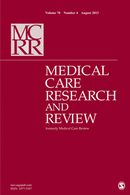Review: The Net Benefits of Depression Management in Primary Care
Medical Care Research and Review, 2010. Volume 67 / Issue 03 / January 2010, pp 251-274, Published online
Depression is often diagnosed and treated in primary care settings. Organizational and systems interventions that restructure primary care practices and train staff have been shown to be cost-effective strategies for treating depression. Funders are increasingly calling for a cost–benefit assessment of such programs. In this study, the authors review existing cost-effectiveness studies of primary care depression treatments, classify them into categories, translate the results into net benefit terms, and assess whether more costly programs generate greater net benefit. The authors find that interventions that provide training to primary care teams in how to manage depression most consistently produce net benefits, with more costly interventions of this type generating larger net benefits than less costly interventions. Collaborative care interventions, which add specialized staff to primary care practices, and therapy interventions, in which clinicians are trained to provide therapy, also generate net social benefits at conventional valuations of quality-adjusted life years.

Publication File
Wagner Faculty
URL